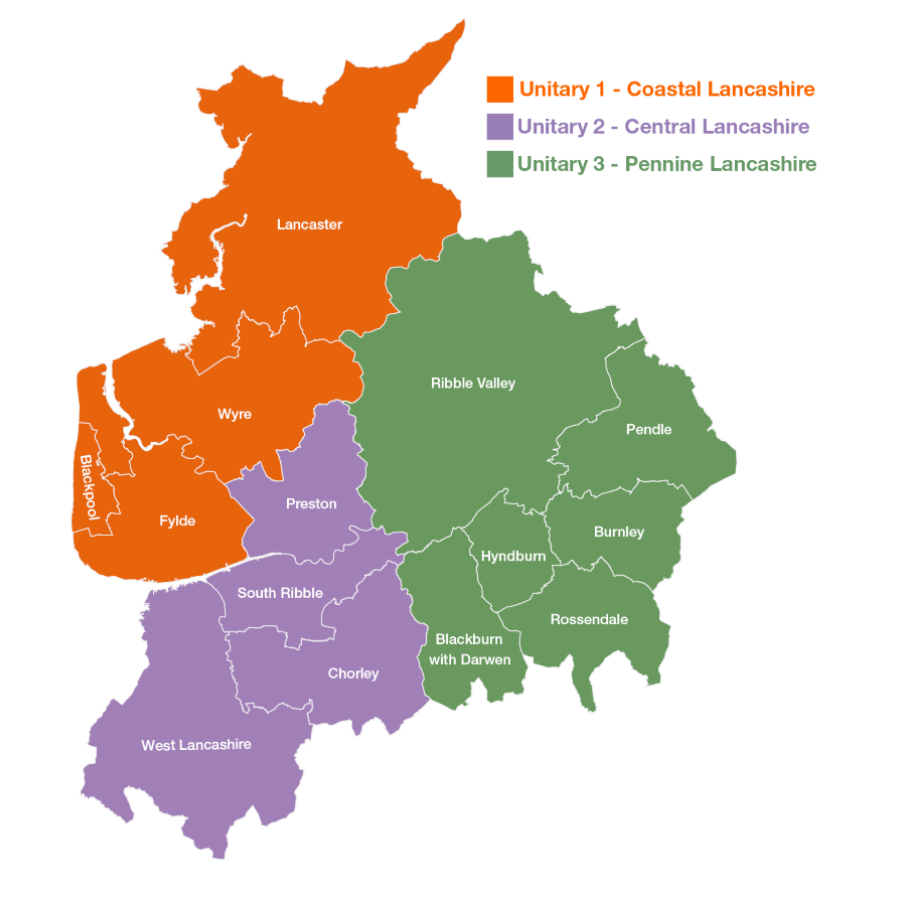Local Government Reorganisation in Lancashire
Local government in Lancashire is set for major change. The Government plans to abolish the current two-tier system of 15 councils and replace it with new unitary authorities that will deliver all local services. This process, known as Local Government Reorganisation (LGR), aims to simplify and streamline how services are provided.
The government’s aims are to:
- Make councils more efficient and financially stable
- Improve service quality and accountability
- Give more power to local communities
Lancashire has submitted its proposals to Government on 28 November 2025, outlining potential options for creating new unitary authorities.
This is separate from the devolution process. You can find more details about the differences between devolution and LGR here - The devolution and LG reorganisation hub | Local Government Association
How services are delivered now
Lancashire predominantly has a two-tier system of local government at present and is made up of 15 councils which includes one county council, two unitary councils, and 12 district councils:
The County Council - Lancashire County Council
Provides county-wide services such as education, highways, transport and social care on behalf of district councils
Unitary Authorities – Blackpool Council and Blackburn with Darwen Council
Provide all services in their area.
District and borough Councils – including Wyre Council, Burnley Borough Council, Chorley Council, Fylde Council, Hyndburn Borough Council, Lancaster City Council, Pendle Borough Council, Preston City Council, Ribble Valley Borough Council, Rossendale Borough Council, South Ribble Borough Council and West Lancashire Borough Council.
Provide local services such as housing, waste collection, and planning.
Wyre Council's Preferred Option
Wyre Council operates successfully as a borough council offering good value for money. However, as part of the Government-led Local Government Reorganisation (LGR) process, all Lancashire councils are required to develop proposals for future arrangements.
Wyre Council has worked closely with Blackburn with Darwen, Fylde, Hyndburn and Rossendale to develop a three-unitary council model as the preferred option for Lancashire. This model can deliver better services, stronger leadership and faster growth, while staying connected to the communities and places that define us. It would provide the smallest council areas that still comply with the government’s requirements.
This model:
- Delivers better services and stronger leadership
- Supports faster economic growth
- Maintains local identity and community connection
- Meets Government requirements for scale and efficiency
Our vision is balanced in scale and rooted in real places, creating the clarity and capacity needed to unlock Lancashire’s potential.
What this means for Wyre
A three-unitary option for Lancashire would bring together Fylde, Blackpool, Wyre and Lancaster to form a new authority with common ground in tourism, industry, transport, energy, and coastal matters representing around 500,000 residents.
For Lancashire, this model would:
- Deliver estimated savings of £188.4 million by 2032
- Keep strong local identities for our unique towns
- Mirror how police, health & other organisations work
- Ensure services stay close to local communities
Read the Executive Summary here
The Proposed Councils under the Three-Unitary Model

Coastal Lancashire
Blackpool, Fylde, Lancaster and Wyre (approx. 493,000 people). A hub for tourism, clean energy and innovation, home to Blackpool’s visitor economy, Heysham’s energy cluster and Lancaster University.
Central Lancashire
Chorley, Preston, South Ribble and West Lancashire (approx. 522,000 people). Strengths in advanced manufacturing, aerospace, digital and agri-tech, supported by major investment and transport links.
Pennine Lancashire
Blackburn with Darwen, Burnley, Hyndburn, Pendle, Ribble Valley and Rossendale (approx. 586,000 people). A nationally significant centre for advanced manufacturing, aerospace and green industries.
Why Three-Unitaries?
We’ve invested significant effort into shaping a vision for Lancashire’s future, one that ensures our economy continues to prosper, our communities receive the support they need, and residents benefit from unitary authorities focused on delivering outstanding local services. This approach has strong backing from existing councils, public sector partners and businesses, it’s financially sustainable and, most importantly, it works for our residents and communities.
People want councils that provide reliable, high-quality services and are committed to helping the region thrive. They expect their local authority to understand their area, its opportunities, and its challenges and the three-unitary model is designed to deliver exactly that.
Additional Proposals
Alongside Wyre’s preferred three-unitary option, several alternative business case proposals are being considered across Lancashire:
- Two-unitary model
- Two different four-unitary models
- Five-unitary model
You can view all the business case proposals online
Timeline
- 20 November – Proposal debated by Full Council
- 26 November – Executive Council approval
- 28 November – Submission to Government
- Spring 2026 – Statutory consultation
- Summer 2026 – Government decision
- May 2027 – Shadow elections
- 1 April 2028 – New councils go live
This page will be updated as information becomes available from central government, partner agencies and the local authorities in Lancashire.
